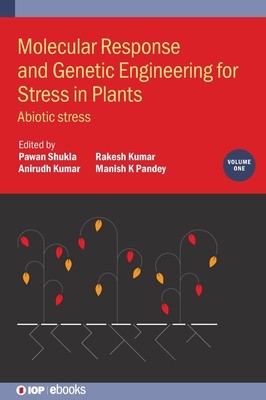
- We will send in 10–14 business days.
- Publisher: IOP Publishing Ltd
- ISBN-10: 0750349190
- ISBN-13: 9780750349192
- Format: 17.8 x 25.4 x 2.1 cm, kieti viršeliai
- Language: English
- SAVE -10% with code: EXTRA
Molecular Response and Genetic Engineering for Stress in Plants, Volume 1 (e-book) (used book) | bookbook.eu
Reviews
Description
An exploration of climate challenges and near possible solution to improve yield, this edited book entitled "Molecular Response and Genetic Engineering for Stress in Plants, Volume 1: Abiotic stress" comprehensively and coherently reviews the different abiotic stress response mechanisms in plants with respect to the various aspects of rapidly growing omics techniques like genomics, transcriptomics, proteomics, metabolomics and strategies through genetic engineering and molecular breeding for crop improvement. It provides a detailed examination of how genes and metabolites are modulated in plants in response to various stresses. The first volume covers the various abiotic stress response mechanisms in plants in the view of climate change and global food security.
Key Features:
- This book explains the different molecular mechanisms and genetic engineering strategies which have been developed and adopted to cope with consistent environmental changes and global climate change.
- It explores the latest developments concerning abiotic stress response at the molecular level for the improvement of crop quality and sustainable agriculture.
- It presents an exploration of the challenges and conceivable solutions to improve yields of the staple of food crops using data on agricultural sciences and omics technology.
- It discovers how the better understanding of molecular mechanisms of plant response to different stress would be used to improve the quantitative and qualitative features of crop plants and allied areas.
- At the end-of-chapter, there is an inclusion of problems and their solutions related to the respective chapter.
EXTRA 10 % discount with code: EXTRA
The promotion ends in 21d.10:32:34
The discount code is valid when purchasing from 10 €. Discounts do not stack.
- Publisher: IOP Publishing Ltd
- ISBN-10: 0750349190
- ISBN-13: 9780750349192
- Format: 17.8 x 25.4 x 2.1 cm, kieti viršeliai
- Language: English English
An exploration of climate challenges and near possible solution to improve yield, this edited book entitled "Molecular Response and Genetic Engineering for Stress in Plants, Volume 1: Abiotic stress" comprehensively and coherently reviews the different abiotic stress response mechanisms in plants with respect to the various aspects of rapidly growing omics techniques like genomics, transcriptomics, proteomics, metabolomics and strategies through genetic engineering and molecular breeding for crop improvement. It provides a detailed examination of how genes and metabolites are modulated in plants in response to various stresses. The first volume covers the various abiotic stress response mechanisms in plants in the view of climate change and global food security.
Key Features:
- This book explains the different molecular mechanisms and genetic engineering strategies which have been developed and adopted to cope with consistent environmental changes and global climate change.
- It explores the latest developments concerning abiotic stress response at the molecular level for the improvement of crop quality and sustainable agriculture.
- It presents an exploration of the challenges and conceivable solutions to improve yields of the staple of food crops using data on agricultural sciences and omics technology.
- It discovers how the better understanding of molecular mechanisms of plant response to different stress would be used to improve the quantitative and qualitative features of crop plants and allied areas.
- At the end-of-chapter, there is an inclusion of problems and their solutions related to the respective chapter.


Reviews